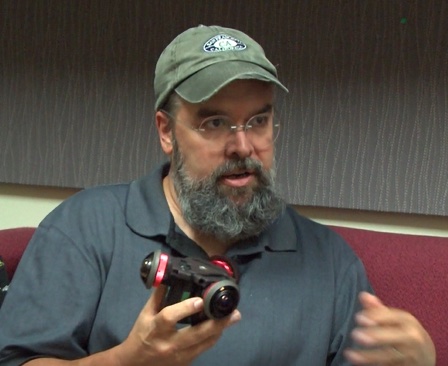Athens Law Enforcement To Receive New High-Tech Training
By: Curtis Feder
Posted on:
ATHENS, Ohio (WOUB) — Students and staff at Ohio University have collaborated with local law enforcement to create a new de-escalation training program for their officers.
This immersive program will be used by the Athens County Sheriff’s Office and the Athens and Ohio University police departments. Officers will undergo training in a different style than in years past: through virtual reality.
The idea for this initiative arose pre-pandemic in 2020. The Voinovich School of Leadership and Public Affairs funded the project, got in contact with local law enforcement, and reached an agreement with them to receive this new training.
“To feel like we could help not only improve safety and build trust with our law enforcement, but also the communities they are serving is a perfect fit,” said John Born, a faculty member at the Voinovich school who had a 26-year career in law enforcement in Appalachia. “The opportunity for not only Ohio University but in this case people serving Appalachia and being served in Appalachia to be able to lead an effort that others across the country can follow is pretty exciting.”

“The camera shoots in every direction,” he said. “So when you put the headset on, wherever the camera was, that is where your head thinks it is. So if you shoot in a bar, it feels like when you put the headset on that you are standing in the bar.”
Unlike a normal filming project, there are additional challenges that must be met to properly capture a scene able to be viewed in 360 degrees.
“Traditionally in film, you can hide all sorts of things like lights, sound people and the director; they all stand behind the camera. In 360, there is no behind the camera,” Williams said. “Also, we don’t have the opportunity to edit as much, so we shoot the entire scene as one large piece. In that sense, it is a lot like theater.”
Ohio University students came to shoot the scenes for the training at multiple locations, such as the Athens Courthouse, the Athens graffiti wall, and a home near the Stuart Opera House in Nelsonville.
The original plan was to shoot the scenes last summer in May and June, but the pandemic put a massive halt to the entire project.
“At first it was a real disappointment because we thought this project might be dead, but instead we spent the entire year of COVID redoing scripts,” Williams said.
What makes the training method of virtual reality useful is immersing officers in a realistic experience and then going back to the same scenario to reanalyze the room and find better, more peaceful alternatives to addressing the situation.
Williams categorized the training into three phases: “premo,” priming their emotions, “emo,” the emotions themselves, and “remo,” reminding them of those emotions.
The program will deliver metal lunch boxes to all of the law enforcement offices, and in order to reach the iPad to start the preliminary training before putting on the virtual reality headset, the officers must touch the lunch box and sift through family photos, thus priming their emotions.
Once the headset is on, the officers will realize the man in distress in the scene has that same lunch box, demonstrating the second phase. Then, once the full training is complete, the lunch box will remain in the stations of the law enforcement agencies as a reminder to the officers of their training not to be hasty or presumptive when first arriving at a scene.
There were other scenes shot for the officers to engage in, including a scenario where a Black person was killed by police and there was a protest organized at the local courthouse.
Williams is confident that training via virtual reality is the way to go for other police departments.
“My bigger hope is that people realize how incredibly effective this sort of training is, and they take this as a benchmark to expand it regionally, statewide or nationally,” he said.
The project is currently in post production and will be ready to be used by the three law enforcement agencies in August.

